Mercy

Oxford University Press is a department of the University of Oxford. It furthers the Universitys objective of excellence in research, scholarship, and education by publishing worldwide. Oxford is a registered trade mark of Oxford University Press in the UK and certain other countries.
Published in the United States of America by Oxford University Press
198 Madison Avenue, New York, NY 10016, United States of America.
Cathal J. Nolan 2023
All rights reserved. No part of this publication may be reproduced, stored in a retrieval system, or transmitted, in any form or by any means, without the prior permission in writing of Oxford University Press, or as expressly permitted by law, by license, or under terms agreed with the appropriate reproduction rights organization. Inquiries concerning reproduction outside the scope of the above should be sent to the Rights Department, Oxford University Press, at the address above.
You must not circulate this work in any other form and you must impose this same condition on any acquirer.
Library of Congress Control Number: 2022941565
ISBN 9780190077280
eISBN 9780190077303
DOI: 10.1093/oso/9780190077280.001.0001
To all who encounter suffering in war
and choose mercy over cruelty

Contents

The quality of mercy is not strained.... It is twice blessed. It blesseth him that gives and him that takes.
William Shakespeare, The Merchant of Venice, Act IV, Scene I
people who are exposed and vulnerable to the exercise of will and power. It is never about one person. Mercy is the grace that happens between those who have a fleeting superiority of physical power and those who cannot save or protect themselves. It is greater than a gift to the helpless and the innocent, for as Shakespeare wrote, it elevates the merciful, too.
Whoever goes to war, there war is. Right in front of them, marked by ugliness and moral starkness but also insistent calls to conscience. War is a confusion of reason, restraint, and calculated violence. It can be anarchic, annihilating customs, rules, and laws. It always challenges hope for mercy and sometimes obliterates it. War presents the most extreme moral environment we encounter: it is humanity at its most exposed and inhumane but sometimes also its most remarkably merciful. This book explores how, inside the essential barbarism of war, some still act with astonishing grace toward their enemy. What is resonant here are these wrenching narratives. The power of their stories cries out for recognition and appreciation of their generous spirit. Why some did what they did may transcend our ability to understand. Nonetheless, it demands our attention.
This book does not seek out the rarified few who are morally exceptional. It does not try to elevate anyone to secular sainthood, a status that is unattainable and hence less interesting to all the rest of us who tread on moral dilemmas with feet of clay. Models of altruism more often shame us than inspire our emulation, because imitation is too hard. Instead, this account depicts ordinary people caught up in an extraordinary swirl of savagery, who did not see themselves as saints or heroes at the time yet showed rare courage and moral restraint. They reacted in a moment of deep crisis with grace and compassion, with empathy for shared humanity with an enemy or the innocent. The goal is to recognize anyone who refused immoral or illegal orders, even at grave personal risk. Who would not pull the trigger to kill a hapless enemy. Who bound wounds, assisted the other sides medics, protected prisoners, shielded civilians. This book presents stories of those who in the midst of violent depravity saw a way back to shared humanity. Who resisted conformity and summoned mercy, if only in a gesture of kindness to a suffering or dying enemy that had no larger consequence. Uninterested in saints, it looks to map a more modest, achievable, and relatable lesson taken from the annals of humanity in war. It begins an accountancy of that mysterious, elegant, and deeply compelling virtue we call mercy.
The misery that greets humanity in each new war is orders of magnitude beyond the suffering of all but the most arduous of impoverished lives. For the most part, anguish is inflicted and is suffered by ordinary men and women. The focus of this account is therefore everyday soldiers, sailors, pilots, nurses, and medics who retained a humane perspective inside the moral fog of war. It takes no regard of nation or uniform. It disdains the false moral claims of commonplace nationalism and related military chauvinism. It gathers tales of any person in any uniform who showed mercy while all around them was extreme violence, and often a promise of state absolution should they commit willful war crimes. It is about those who did an uncommon thing at high risk to their own lives. It searches for clues about why they acted as they did, asking if they had innate integrity while others nearby acted so differently. Was their virtue individual, or did honor codes and officer accountability help stay the hand of cruelty? Is the ideal of mercy in war respected mainly in the breach? Is it all mostly myth: Saladin the Merciful; chivalry as a warrior ideal in the medieval West; ideas of the Just War that rode alongside crusade and jihad; aristocratic notions of the honor of elites and officers; bushid in 20th-century Japan, fabricated by the Meiji state to bind its new model army to itself and the nation?
Traditional military history framed a secular hagiography of warriors in stained-glass windows, calling for us to stare upward and admire them. Like cathedral images of dead saints of the old religions, the effect, if not the intention, is to distort memory into legend, deflect examination of harder facts, and substitute triumph for truth. We celebrate flawed generals like Caesar or Arminius, Henry V or Tokugawa Ieyasu, Michel Ney or Robert E. Lee, Georgy Zhukov or V Nguyn Gip. Such grand heroes too often provide a faade for lies to manipulate the young and public opinion. They disguise political and cultural myth-making and, too often, terrible crimes. Mercy is a truer mark of heroic character in war. It appears in almost every war. We see it in compassionate soldiers serving in nearly every army, even the most vile. We see it in Germans and French facing off across a pockmarked no-mans-land, not shooting at enemy work parties or mortaring latrines or attacking during breakfast. Also in a Medal of Honor winner who killed hundreds of Germans in 1918, yet turned his gun on his own company to save a helpless German boy solider whom they intended to murder.
Mercy animated a young lieutenant wearing Nazi Germanys feldgrau in the Hrtgen Forest in 1944, who died while trying to rescue a wounded American lying beyond the hearing of his own medics. An older Ukrainian tanker chose not to pull the trigger on his counterpart scrambling to flee a damaged Russian tank in 2015, then posted on Facebook a call to his enemys mother pleading for her son to leave the war. We find mercy in medics who move from under cover to reach the wounded; nurses who brave front lines or work themselves to physical and moral exhaustion in burn or gas wards; doctors who surrender to stay behind with the wounded; surgeons who operate on enemy prisoners first, before less urgent cases on their own side; soldiers who tenderly care for a dying man who tried to kill them the day or an hour before. We find it in officers who allow ambulances to come and go or who supply food and medicine to cut off medical units from the other side.

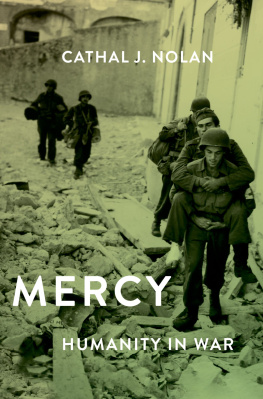

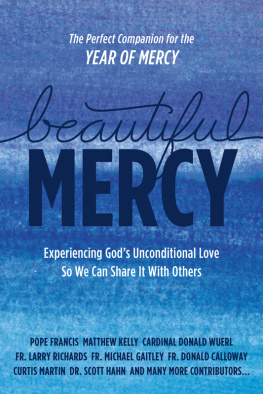
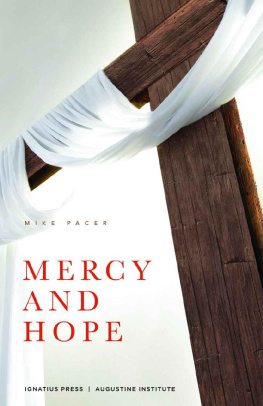
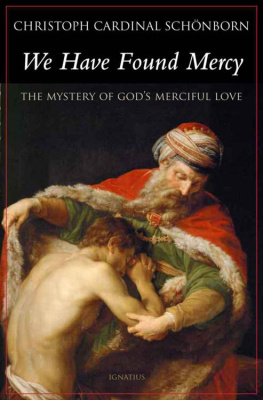
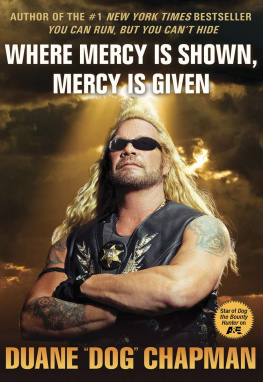
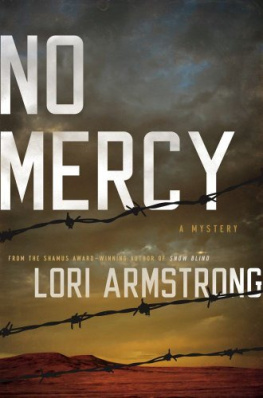


 Contents
Contents